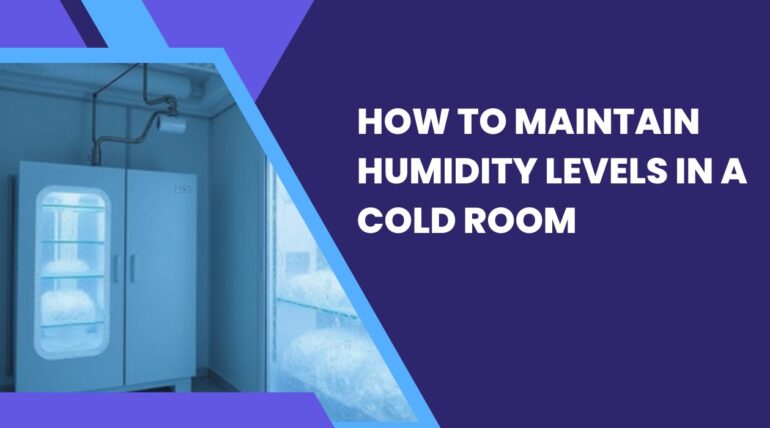
December 7, 2024
Maintaining optimal humidity levels in cold rooms is crucial for preserving the quality and safety of temperature-sensitive products, especially in regions like the UAE where extreme temperatures can pose significant challenges. This detailed guide will explore the importance of humidity control, methods to maintain appropriate humidity levels, and practical tips tailored to businesses operating in the UAE.
Understanding Humidity in Cold Rooms
How to Maintain Humidity Levels in a Cold Room
Maintaining optimal humidity levels in cold rooms is crucial for preserving the quality and safety of temperature-sensitive products, especially in regions like the UAE where extreme temperatures can pose significant challenges. This detailed guide will explore the importance of humidity control, methods to maintain appropriate humidity levels, and practical tips tailored to businesses operating in the UAE.
Understanding Humidity in Cold Rooms
What is Humidity?
Humidity refers to the amount of water vapor present in the air, expressed as a percentage known as relative humidity (RH). This percentage indicates how much moisture the air contains compared to its maximum capacity at a given temperature.
Why is Humidity Control Important?
In cold storage environments, maintaining proper humidity levels is crucial for several reasons:
- Product Integrity: High humidity can lead to condensation, causing spoilage or degradation of products such as food and pharmaceuticals. Cold rooms storing medications should ideally maintain humidity levels below 65% to prevent degradation.
- Microbial Growth: Excess moisture promotes mold and bacteria growth, compromising product safety. High RH levels (90-100%) can create an ideal environment for contaminants.
- Energy Efficiency: Proper humidity control enhances energy efficiency by reducing the load on refrigeration systems, which can be particularly beneficial in hot climates like the UAE.
Ideal Humidity Levels for Cold Rooms
The ideal humidity levels vary depending on the type of products stored:
- Food Products: Generally, a relative humidity of 85% to 90% is recommended for fresh produce. Dry goods may require lower levels around 50% to 60%.
- Pharmaceuticals: Most pharmaceuticals require a relative humidity between 30% and 60% to ensure stability and efficacy.
Specific Humidity Requirements by Product Type
| Product Type | Temperature Range | Recommended RH |
| Fresh Produce | 0°C to 5°C | 85% to 95% |
| Meat | -1°C to 3°C | 85% to 95% |
| Dairy | 2°C to 4°C | 65% to 70% |
| Pharmaceuticals | 2°C to 8°C | 45% to 60% |
| Baked Goods | Varies | 50% to 60% |
Factors Affecting Humidity Levels
Several factors influence humidity levels in cold rooms:
- Temperature Fluctuations: Changes in temperature impact moisture levels; warmer air holds more moisture than cooler air.
- Air Exchange: Ventilation systems that introduce outside air can alter indoor humidity levels, especially in arid climates like the UAE.
- Product Load: The type and quantity of products stored affect moisture levels; fresh produce releases moisture into the air.
Methods to Maintain Humidity Levels
Use of Humidifiers
Humidifiers add moisture to the air. In cold rooms, they help maintain desired humidity levels, especially during dry seasons or when using refrigeration systems that tend to dry out the air.
Dehumidifiers
Dehumidifiers remove excess moisture from the air. They are particularly useful in environments where high humidity levels are a concern, preventing condensation and microbial growth.
Proper Insulation
Effective insulation minimizes air exchange with the outside environment. Insulated walls and doors reduce the risk of warm air entering cold rooms, thus maintaining stable humidity levels.
Regular Monitoring
Implementing a reliable monitoring system for both temperature and humidity is essential. Digital hygrometers and data loggers provide real-time readings and alerts when conditions deviate from set parameters.
Airflow Management
Proper airflow ensures even distribution of temperature and humidity within cold rooms. Avoid overcrowding shelves and ensure adequate space between products for better circulation.
Sealing Gaps and Cracks
Inspect cold room structures for gaps or cracks that allow outside air to enter. Sealing these openings prevents unwanted fluctuations in both temperature and moisture levels.
Best Practices for Humidity Management
To effectively manage humidity levels in cold rooms, consider these best practices:
- Routine Maintenance: Regularly service air conditioning systems to ensure they operate efficiently.
- Calibration of Equipment: Periodically calibrate humidifiers and dehumidifiers for accurate performance.
- Training Staff: Educate staff on maintaining proper conditions and operating equipment effectively.
- Implementing Backup Systems: In case of equipment failure, having backup systems can prevent drastic changes in humidity that could harm stored products.
Challenges Specific to the UAE
The UAE’s climate presents unique challenges for maintaining humidity levels in cold rooms:
- High External Temperatures: The extreme heat can lead to increased evaporation rates, necessitating robust humidification solutions.
- Low Ambient Humidity: The arid environment means outdoor air often has low moisture content, making it essential to monitor internal conditions closely.
- Energy Costs: Cooling systems have high energy costs, so finding efficient solutions for managing temperature and humidity is crucial.
Conclusion
Maintaining optimal humidity levels in cold rooms is vital for ensuring product quality and safety, particularly in challenging climates like the UAE’s. By employing effective methods such as humidification systems, regular monitoring, proper insulation, and staff training, businesses can create an environment conducive to preserving their valuable products.
For businesses seeking expert assistance with their HVAC needs, BestAirServices offers comprehensive solutions tailored specifically for commercial refrigeration and air conditioning requirements throughout Dubai and Al Ain. With over ten years of experience in providing high-quality services,
BestAir Services ensures your cold storage facilities operate efficiently while maintaining optimal conditions for your products. Trust BestAir Services to help you achieve your business goals while maximizing energy efficiency and minimizing costs.


